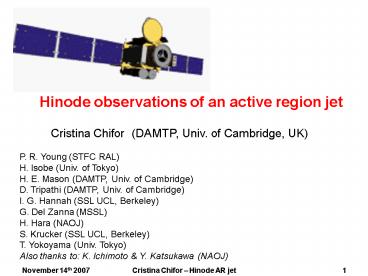Active region Xray jets observed with Hinode and RHESSI - PowerPoint PPT Presentation
1 / 16
Title: Active region Xray jets observed with Hinode and RHESSI
1
Hinode observations of an active region jet
Cristina Chifor (DAMTP, Univ. of Cambridge,
UK) P. R. Young (STFC RAL) H. Isobe (Univ. of
Tokyo) H. E. Mason (DAMTP, Univ. of Cambridge) D.
Tripathi (DAMTP, Univ. of Cambridge) I. G. Hannah
(SSL UCL, Berkeley) G. Del Zanna (MSSL) H. Hara
(NAOJ) S. Krucker (SSL UCL, Berkeley) T. Yokoyama
(Univ. Tokyo) Also thanks to K. Ichimoto Y.
Katsukawa (NAOJ)
2
XRT observed an AR recurrent jet
2007 Jan. 15 2206 Jan 16. 0212 UT
West of NOAA AR 10938
XRT Thin Al_poly (2-10 MK) 1 min cadence, 2/
pixel
22 24 UT
XRT overlay on SOT FG Stokes V
3
X-ray jet/microflare /type III bursts association
GOES B1.9 microflare
RHESS I
Wind radio spectrometer
4
RHESSI observed the microflare associated with
the jet
Little non-thermal emission from spectral
analysis BUT the associated type III burst gives
supporting evidence.
RHESSI (CLEAN) 4-8 keV and 12-16 keV emission
at the footpoint (?) of the cusp-shaped feature
observed in XRT.
5
Magnetic field evolution inSOT (NFI) images
1 min cadence 0.16/pixel
Fe 6302 Stokes V
Negative polarity (white) decreases, then
dissapears !
6
Correlation cancelling B flux, the X-ray jet
emission, and Ca II H brightenings
Abrupt B decrease prior to each X-ray jet
Preliminary result 2 x 1019 (Mx) drop in B
flux (using SOT NIS calibration from Chae et al.
2007, PASJ)
7
EIS observes a late instance of the jet
HH_ARFLR_RAS_N01(J) Raster times 0154
0220 UT 1 slit, and 5s exposures 240 x 240
area
0201 UT XRT EIS FE XII
Y(arcsec)
8
Jet Doppler-shifts and density
- Instrumental corrections
- EIS slit tilt
- Orbital variation
- (using quieter raster region)
- Reference wvl. average
- in quieter area
- Strong blue-shift
- Red-shift at footpoint?
9
Fe XII 186/195 density diagnostics
Theoretical line ratios (CHIANTI)
Filling factor 0.03 Using Fe XII 195
Assumptions Isothermal plasma (log T
6.1) Coronal abund. (Feldman et al. 1992)
10
Summary of results
- Correlation between recurrent (quasi-periodic) B
flux cancellation and X-ray jet (Ca II H )
emission decreasing in strength with each jet. - Non-thermal emission during the jet-associated
microflare (RHESSI spectral analysis, Wind type
III burst). - A strong blue-shifted component (150 Km/s) an
indication of a red-shifted component of the jet. - Log Ne 11 for the up-flow jet component
- low filling factor
11
Conclusions so far
- Magnetic cancellation associated with the jets
non-thermal emission gap between cancelling
positive negative polarities - magnetic reconnection at coronal heights.
- The large density / small filling factor large
Doppler-shift velocities - multiple small-scale B reconnection.
- High-velocity up-flows support an evaporation
scenario for the jet acceleration.
12
Thank you very much !
13
EUV jets in Stereo/SECCHI/EUVI
SECCHI Fe XII 195 SECCHI Fe IX/X 171
XRT jet SECCHI EUVI diff. images
XRT jet vs. SECCHI EUVI 171
14
Jet evolution in Ca II H SOT (BFI)
15
(No Transcript)
16
(No Transcript)































